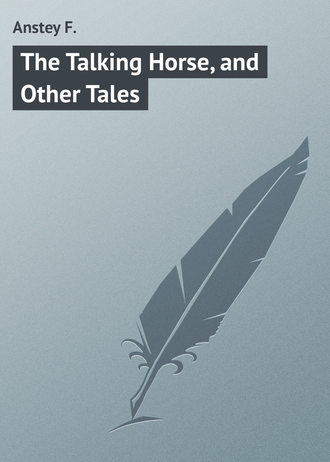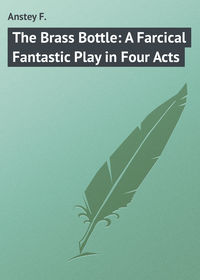 полная версия
полная версияThe Talking Horse, and Other Tales
'I am not fun, Dick. I think fun is generally so very vulgar, and oh, I wish you wouldn't say "by Jove!" Surely you know he was a heathen god!'
'I seem to have heard of him in some such capacity,' said Dick. 'I say, Prissie, what a ripping big ruby!'
'Ah, Dick, Dick, you are like the others! I'm afraid you think more of the jewels than of any words I may say – and yet jewels are common enough!'
'They seem to be with you. Pearls, too, and such fine ones! Here, Priscilla, take them; they're your property.'
Priscilla put her hands behind her: 'No, indeed, Dick, they are of no use to me. Keep them, please; they may help to remind you of what I have said.'
'It's awfully kind of you,' said Dick, looking really touched. 'Then – since you put it in that way – thanks, I will, Priscilla. I'll have them made into a horse-shoe pin.'
'You mustn't let it make you too fond of dress, then,' said Priscilla; 'but I'm afraid you're that already, Dick.'
'A diamond!' he cried; 'go on, Priscilla, I'm listening – pitch into me, it will do me a lot of good!'
But Priscilla thought it wisest to say no more just then.
That night, after Priscilla and Cathie and Belle had gone to bed, Dick and his mother sat up talking until a late hour.
'Is dear little cousin Priscilla to be a permanency in this establishment?' began her cousin, stifling a yawn, for there had been a rather copious flow of precious stones during the evening.
'Well, I shall keep her with us as long as I can,' said Mrs. Hoyle, 'she's such a darling, and they don't seem to want her at home. I'm sure, limited as my means are, I'm most happy to have such a visitor.'
'She seems to pay her way – only her way is a trifle trying at times, isn't it? She lectured me for half an hour on end without a single check!'
'Are you sure you picked them all up, dear boy?'
'Got a few of the best in my waistcoat-pocket now. I'm afraid I scrunched a pearl or two, though: they were all over the place, you know. I suppose you've been collecting too, mater?'
'I picked up one or two,' said his mother; 'I should think I must have nearly enough now to fill a bandbox. And that brings me to what I wanted to consult you about, Richard. How are we to dispose of them? She has given them all to me.'
'You haven't done anything with them yet, then?'
'How could I? I have been obliged to stay at home: I've been so afraid of letting that precious child go out of my sight for a single hour, for fear some unscrupulous persons might get hold of her. I thought that perhaps, when you came home, you would dispose of the jewels for me.'
'But, mater,' protested Dick, 'I can't go about asking who'll buy a whole bandbox full of jewels!'
'Oh, very well, then; I suppose we must go on living this hugger-mugger life when we have the means of being as rich as princes, just because you are too lazy and selfish to take a little trouble!'
'I know something about these things,' said Dick. 'I know a fellow who's a diamond merchant, and it's not so easy to sell a lot of valuable stones as you seem to imagine, mother. And then Priscilla really overdoes it, you know – why, if she goes on like this, she'll make diamonds as cheap as currants!'
'I should have thought that was a reason for selling them as soon as possible; but I'm only a woman, and of course my opinion is worth nothing! Still, you might take some of the biggest to your friend, and accept whatever he'll give you for them – there are plenty more, you needn't haggle over the price.'
'He'd want to know all about them, and what should I say? I can't tell him a cousin of mine produces them whenever she feels disposed.'
'You could say they have been in the family for some time, and you are obliged to part with them; I don't ask you to tell a falsehood, Richard.'
'Well, to tell you the honest truth,' said Dick, 'I'd rather have nothing to do with it. I'm not proud, but I shouldn't like it to get about among our fellows at the bank that I went about hawking diamonds.'
'But, you stupid, undutiful boy, don't you see that you could leave the bank – you need never do anything any more – we should all live rich and happy somewhere in the country, if we could only sell those jewels! And you won't do that one little thing!'
'Well,' said Dick, 'I'll think over it. I'll see what I can do.'
And his mother knew that it was perfectly useless to urge him any further: for, in some things, Dick was as obstinate as a mule, and, in others, far too easy-going and careless ever to succeed in life. He had promised to think over it, however, and she had to be contented with that.
On the evening following this conversation cousin Dick entered the sitting-room the moment after his return from the City, and found his mother to all appearances alone.
'What a dear sweet little guileless angel cousin Priscilla is, to be sure!' was his first remark.
'Then you have sold some of the stones!' cried Aunt Margarine. 'Sit down, like a good boy, and tell me all about it.'
'Well,' said Dick, 'I took the finest diamonds and rubies and pearls that escaped from that saintlike child last night in the course of some extremely disparaging comments on my character and pursuits – I took those jewels to Faycett and Rosewater's in New Bond Street – you know the shop, on the right-hand side as you go up – '
'Oh, go on, Dick; go on – never mind where it is – how much did you get for them?'
'I'm coming to that; keep cool, dear mamma. Well, I went in, and I saw the manager, and I said: "I want you to make these up into a horse-shoe scarf-pin for me."'
'You said that! You never tried to sell one? Oh, Dick, you are too provoking!'
'Hold on, mater; I haven't done yet. So the manager – a very gentlemanly person, rather thin on the top of the head – not that that affects his business capacities; for, after all – '
'Dick, do you want to drive me frantic!'
'I can't conceive any domestic occurrence which would be more distressing or generally inconvenient, mother dear. You do interrupt a fellow so! I forgot where I was now – oh, the manager, ah yes! Well, the manager said, "We shall be very happy to have the stones made in any design you may select" – jewellery, by the way, seems to exercise a most refining influence upon the manners: this man had the deportment of a duke – "you may select," he said; "but of course I need not tell you that none of these stones are genuine."'
'Not genuine!' cried Aunt Margarine excitedly. 'They must be – he was lying!'
'West-end jewellers never lie,' said Dick; 'but naturally, when he said that, I told him I should like to have some proof of his assertion. "Will you take the risk of testing?" said he. "Test away, my dear man!" said I. So he brought a little wheel near the emerald – "whizz!" and away went the emerald! Then he let a drop of something fall on the ruby – and it fizzled up for all the world like pink champagne. "Go on, don't mind me!" I told him, so he touched the diamond with an electric wire – "phit!" and there was only something that looked like the ash of a shocking bad cigar. Then the pearls – and they popped like so many air-balloons. "Are you satisfied?" he asked.
'"Oh, perfectly,"' said I, "you needn't trouble about the horse-shoe pin now. Good evening," and so I came away, after thanking him for his very amusing scientific experiments.'
'And do you believe that the jewels are all shams, Dick? – do you really?'
'I think it so probable that nothing on earth will induce me to offer a single one for sale. I should never hear the last of it at the bank. No, mater, dear little Priscilla's sparkling conversation may be unspeakably precious from a moral point of view, but it has no commercial value. Those jewels are bogus – shams every stone of them!'
Now, all this time our heroine had been sitting unperceived in a corner behind a window-curtain, reading 'The Wide, Wide World,' a work which she was never weary of perusing. Some children would have come forward earlier, but Priscilla was never a forward child, and she remained as quiet as a little mouse up to the moment when she could control her feelings no longer.
'It isn't true!' she cried passionately, bursting out of her retreat and confronting her cousin; 'it's cruel and unkind to say my jewels are shams! They are real – they are, they are!'
'Hullo, Prissie!' said her abandoned cousin; 'so you combine jewel-dropping with eaves-dropping, eh?'
'How dare you!' cried Aunt Margarine, almost beside herself, 'you odious little prying minx, setting up to teach your elders and your betters with your cut and dried priggish maxims! When I think how I have petted and indulged you all this time, and borne with the abominable litter you left in every room you entered – and now to find you are only a little, conceited, hypocritical impostor – oh, why haven't I words to express my contempt for such conduct – why am I dumb at such a moment as this?'
'Come, mother,' said her son soothingly, 'that's not such a bad beginning; I should call it fairly fluent and expressive, myself.'
'Be quiet, Dick! I'm speaking to this wicked child, who has obtained our love and sympathy and attention on false pretences, for which she ought to be put in prison – yes, in prison, for such a heartless trick on relatives who can ill afford to be so cruelly disappointed!'
'But, aunt!' expostulated poor Priscilla, 'you always said you only kept the jewels as souvenirs, and that it did you so much good to hear me talk!'
'Don't argue with me, miss! If I had known the stones were wretched tawdry imitations, do you imagine for an instant – ?'
'Now, mother,' said Dick, 'be fair – they were uncommonly good imitations, you must admit that!'
'Indeed, indeed I thought they were real, the fairy never told me!'
'After all,' said Dick, 'it's not Priscilla's fault. She can't help it if the stones aren't real, and she made up for quality by quantity anyhow; didn't you, Prissie?'
'Hold your tongue, Richard; she could help it, she knew it all the time, and she's a hateful, sanctimonious little stuck-up viper, and so I tell her to her face!'
Priscilla could scarcely believe that kind, indulgent, smooth-spoken Aunt Margarine could be addressing such words to her; it frightened her so much that she did not dare to answer, and just then Cathie and Belle came into the room.
'Oh, mother,' they began penitently, 'we're so sorry, but we couldn't find dear Prissie anywhere, so we haven't picked up anything the whole afternoon!'
'Ah, my poor darlings, you shall never be your cousin's slaves any more. Don't go near her, she's a naughty, deceitful wretch; her jewels are false, my sweet loves, false! She has imposed upon us all, she does not deserve to associate with you!'
'I always said Prissie's jewels looked like the things you get on crackers!' said Belle, tossing her head.
'Now we shall have a little rest, I hope,' chimed in Cathie.
'I shall send her home to her parents this very night,' declared Aunt Margarine; 'she shall not stay here to pervert our happy household with her miserable gewgaws!'
Here Priscilla found her tongue. 'Do you think I want to stay?' she said proudly; 'I see now that you only wanted to have me here because – because of the horrid jewels, and I never knew they were false, and I let you have them all, every one, you know I did; and I wanted you to mind what I said and not trouble about picking them up, but you would do it! And now you all turn round upon me like this! What have I done to be treated so? What have I done?'
'Bravo, Prissie!' cried Dick. 'Mother, if you ask me, I think it serves us all jolly well right, and it's a downright shame to bullyrag poor Prissie in this way!'
'I don't ask you,' retorted his mother, sharply; 'so you will kindly keep your opinions to yourself.'
'Tra-la-la!' sang rude Dick, 'we are a united family – we are, we are, we are!' – a vulgar refrain he had picked up at one of the burlesque theatres he was only too fond of frequenting.
But Priscilla came to him and held out her hand quite gratefully and humbly. 'Thank you, Dick,' she said; 'you are kind, at all events. And I am sorry you couldn't have your horse-shoe pin!'
'Oh, hang the horse-shoe pin!' exclaimed Dick, and poor Priscilla was so thoroughly cast down that she quite forgot to reprove him.
She was not sent home that night after all, for Dick protested against it in such strong terms that even Aunt Margarine saw that she must give way; but early on the following morning Priscilla quitted her aunt's house, leaving her belongings to be sent on after her.
She had not far to walk, and it so happened that her way led through the identical lane in which she had met the fairy. Wonderful to relate, there, on the very same stone and in precisely the same attitude, sat the old lady, peering out from under her poke-bonnet, and resting her knotty old hands on her crutch-handled stick!
Priscilla walked past with her head in the air, pretending not to notice her, for she considered that the fairy had played her a most malicious and ill-natured trick.
'Heyday!' said the old lady (it is only fairies who can permit themselves such old-fashioned expressions nowadays). 'Heyday, why, here's my good little girl again! Isn't she going to speak to me?'
'No, she's not,' said Priscilla – but she found herself compelled to stop, notwithstanding.
'Why, what's all this about? You're not going to sulk with me, my dear, are you?'
'I think you're a very cruel, bad, unkind old woman for deceiving me like this!'
'Goodness me! Why, didn't the jewels come, after all?'
'Yes – they came, only they were all horrid artificial ones – and it is a shame, it is!' cried poor Priscilla from her bursting heart.
'Artificial, were they? that really is very odd! Can you account for that at all, now?'
'Of course I can't! You told me that they would drop out whenever I said anything to improve people – and I was always saying something improving! Aunt had a bandbox in her room quite full of them.'
'Ah, you've been very industrious, evidently; it's unfortunate your jewels should all have been artificial – most unfortunate. I don't know how to explain it, unless' – (and here the old lady looked up queerly from under her white eyelashes), 'unless your goodness was artificial too?'
'How do you mean?' asked Priscilla, feeling strangely uncomfortable. 'I'm sure I've never done anything the least bit naughty – how can my goodness possibly be artificial?'
'Ah, that I can't explain; but I know this – that people who are really good are generally the last persons to suspect it, and the moment they become aware of it and begin to think how good they are, and how bad everybody else is, why, somehow or other, their goodness crumbles away and leaves only a sort of outside shell behind it. And – I'm very old, and of course I may be mistaken – but I think (I only say I think, mind) that a little girl so young as you must have some faults hidden about her somewhere, and that perhaps on the whole she would be better employed in trying to find them out and cure them before she attempted to correct those of other people. And I'm sure it can't be good for any child to be always seeing herself in a little picture, just as she likes to fancy other people see her. Very many pretty books are written about good little girls, and it is quite true that children may exercise a great influence for good – more than they can ever tell, perhaps – but only just so long as they remain natural and unconscious, and not unwholesome little pragmatical prigesses; for then they make themselves and other people worse than they might have been. But of course, my dear, you never made such a mistake as that!'
Priscilla turned very red, and began to scrape one of her feet against the other; she was thinking, and her thoughts were not at all pleasant ones.
'Oh, fairy,' she said at last, 'I'm afraid that's just what I did do. I was always thinking how good I was and putting everybody – papa, mamma, Alick, Betty, Aunt Margarine, Cathie, Belle, and even poor cousin Dick – right! I have been a horrid little hateful prig, and that's why all the jewels were rubbish. But, oh, shall I have to go on talking sham diamonds and things all the rest of my life?'
'That,' said the fairy, 'depends entirely on yourself. You have the remedy in your own hands – or lips.'
'Ah, you mean I needn't talk at all? But I must – sometimes. I couldn't bear to be dumb as long as I lived – and it would look so odd, too!'
'I never said you were not to open your lips at all. But can't you try to talk simply and naturally – not like little girls or boys in any story-books whatever – not to "show off" or improve people; only as a girl would talk who remembers that, after all, her elders are quite as likely as she is to know what they ought or ought not to do and say?'
'I shall forget sometimes, I know I shall!' said Priscilla disconsolately.
'If you do, there will be something to remind you, you know. And by and by, perhaps, as you grow up you may, quite by accident, say something sincere and noble and true – and then a jewel will fall which will really be of value!'
'No!' cried Priscilla, 'no, please! Oh, fairy, let me off that! If I must drop them, let them be false ones to punish me – not real. I don't want to be rewarded any more for being good – if I ever am really good!'
'Come,' said the fairy, with a much pleasanter smile, 'you are not a hopeless case, at all events. It shall be as you wish, then, and perhaps it will be the wisest arrangement for all parties. Now run away home, and see how little use you can make of your fairy gift.'
Priscilla found her family still at breakfast.
'Why,' observed her father, raising his eyebrows as she entered the room, 'here's our little monitor – (or is it monitress, eh, Priscilla?) – back again. Children, we shall all have to mind our p's and q's – and, indeed, our entire alphabet, now!'
'I'm sure,' said her mother, kissing her fondly, 'Priscilla knows we're all delighted to have her home!'
'I'm not,' said Alick, with all a boy's engaging candour.
'Nor am I,' added Betty, 'it's been ever so much nicer at home while she's been away!'
Priscilla burst into tears as she hid her face upon her mother's protecting shoulder. 'It's true!' she sobbed, 'I don't deserve that you should be glad to see me – I've been hateful and horrid, I know – but, oh, if you'll only forgive me and love me and put up with me a little, I'll try not to preach and be a prig any more – I will truly!'
And at this her father called her to his side and embraced her with a fervour he had not shown for a very long time.
I should not like to go so far as to assert that no imitation diamond, ruby, pearl, or emerald ever proceeded from Priscilla's lips again. Habits are not cured in a day, and fairies – however old they may be – are still fairies; so it did occasionally happen that a mock jewel made an unwelcome appearance after one of Priscilla's more unguarded utterances. But she was always frightfully ashamed and abashed by such an accident, and buried the imitation stones immediately in a corner of the garden. And as time went on the jewels grew smaller and smaller, and frequently dissolved upon her tongue, leaving a faintly bitter taste, until at last they ceased altogether and Priscilla became as pleasant and unaffected a girl as she who may now be finishing this history.
Aunt Margarine never sent back the contents of that bandbox; she kept the biggest stones and had a brooch made of them, while, as she never mentioned that they were false, no one out of the family ever so much as suspected it.
But, for all that, she always declared that her niece Priscilla had bitterly disappointed her expectations – which was perhaps the truest thing that Aunt Margarine ever said.
A MATTER OF TASTE
PART I
It is a little singular that, upon an engagement becoming known and being discussed by the friends and acquaintances of the persons principally concerned, by far the most usual tone of comment should be a sorrowing wonder. That particular alliance is generally the very last that anybody ever expected. 'What made him choose her, of all people,' and 'What on earth she could see in him,' are declared insoluble problems. It is confidently predicted that the engagement will never come to anything, or that, if such a marriage ever does take place, it is most unlikely to prove a success.
Sometimes, in the case of female friends, this tone is even perceptible under their warmest felicitations, and through the smiling mask of compliment shine eyes moist with the most irritating quality of compassion. 'So glad! so delighted! But why, why didn't you consult me?' – this complicated expression might be rendered: 'I could have saved you from this – I was so pleased to hear of it!'
And yet, in the majority of cases, these unions are not found to turn out so very badly after all, and the misguided couple seem really to have gauged their own hearts and their possibilities of happiness together more accurately than the most clear-sighted of their acquaintances.
The announcement that Ella Hylton had accepted George Chapman provoked the customary sensation and surprise in their respective sets, and perhaps with rather more justification than usual.
Miss Hylton had undeniable beauty of a spiritual and rather exalté type, and was generally understood to be highly cultivated. She had spent a year at Somerville, though she had gone down without trying for a place in either 'Mods.' or 'Greats,' thereby preserving, if not increasing, her reputation for superiority. She had lived all her life among cultured people; she was devoted to music and regularly attended the Richter Concerts, though she could seldom be induced to play in public; she had a feeling for art, though she neither painted nor drew; a love of literature strong enough to deter her from all amateur efforts in that direction. In art, music and literature she was impatient of mediocrity; and, while she was as fond as most girls of the pleasures which upper middle-class society can offer, she reverenced intellect, and preferred the conversation of the plainest celebrity to the platitudes of the mere dancing-man, no matter how handsome of feature and perfect of step he might be.
George Chapman was certainly not a mere dancing-man, his waltzing being rather conscientious than dreamlike, and he was only tolerably good-looking. On the other hand, he was not celebrated in any way, and even his mother and sisters had never considered him brilliant. He had been educated at Rugby and Trinity, Cambridge, where he rowed a fairly good oar, on principle, and took a middle second in the Moral Science Tripos. Now he was in a solicitor's office, where he was receiving a good salary, and was valued as a steady, sensible young fellow, who could be thoroughly depended upon. He was fond of his profession, and had acquired a considerable knowledge of its details; apart from it he had no very decided tastes; he lived a quiet, regular life, and dined out and went to dances in moderation; his manner, though he was nearly twenty-six, was still rather boyishly blunt.
What there was in him that had found favour in Ella Hylton's fastidious eyes the narrator is not rash enough to attempt to particularise. But it may be suggested that the most unlikely people may possess their fairy rose and ring which render them irresistible to at least one heart, if they only have faith to believe in and luck to perceive their power.
So, early in the year, George had plucked up courage to propose to Miss Hylton, after meeting and secretly adoring her for some months past, and she, to the general astonishment, had accepted him.
He had a private income – not a large one – of his own, and had saved out of it. She was entitled under her grandmother's will to a sum which made her an heiress in a modest way, and thus there was no reason why the engagement should be a long one, and, though no date had been definitely fixed for the marriage, it was understood that it should take place at some time before the end of the summer.









